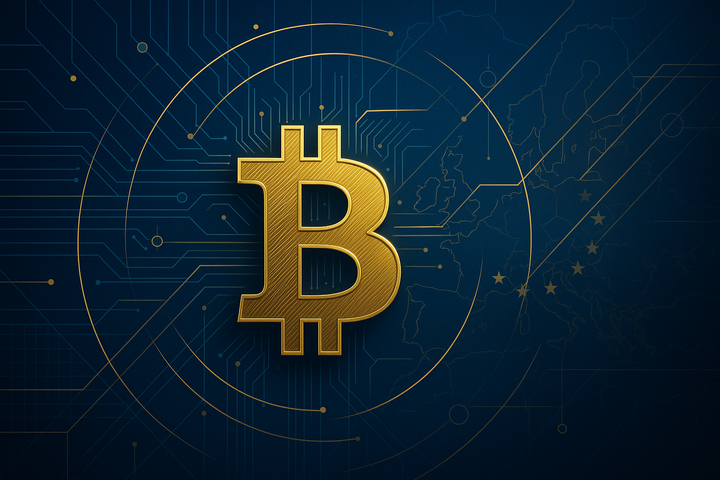Bitcoin as Catalyst for Global Free Markets
The April 15, 2025 episode of Bitcoin Infinity Show featuring Joe Bryan examines how Bitcoin’s separation of money and state can correct fiat system distortions. The discussion highlights first principles thinking and decentralized alignment as drivers for a global free market.

- My 'briefing notes' summarize the content of podcast episodes; they do not reflect my own views.
- They contain (1) a summary of podcast content, (2) potential information gaps, and (3) some speculative views on wider Bitcoin implications.
- Pay attention to broadcast dates (I often summarize older episodes)
- Some episodes I summarize may be sponsored: don't trust, verify, if the information you are looking for is to be used for decision-making.
Summary
The April 15, 2025 episode of Bitcoin Infinity Show featuring Joe Bryan examines how Bitcoin’s separation of money and state can correct fiat system distortions. The discussion highlights first principles thinking and decentralized alignment as drivers for a global free market. This analysis offers insights for policymakers and industry stakeholders preparing for systemic transitions.
Take-Home Messages
- Separation of Money and State: Bitcoin disrupts centralized monetary control by decoupling government influence from money.
- First Principles Thinking: Clear, foundational logic underpins Bitcoin’s superiority over fiat systems.
- Global Educational Outreach: Multilingual, accessible content is crucial for accelerating Bitcoin’s mass adoption.
- Policy and Institutional Resistance: Addressing established financial interests is essential for a smooth transition.
- Inevitable Transition: Strategic forecasting and proactive adaptation are necessary to harness Bitcoin’s long-term benefits.
Overview
Joe Bryan, a former derivatives trader turned Bitcoin advocate, shares his journey into the Bitcoin space and details the origins of his influential presentation, “What’s the Problem.” His narrative emphasizes that separating money from state control is crucial to resolving global economic distortions.
The broadcast argues that Bitcoin’s advantages stem from applying first principles and Austrian economics to understand monetary value. Bryan articulates that conventional fiat systems are undermined by inflation and unsustainable debt, which Bitcoin can remediate. He underscores that adopting Bitcoin requires rethinking traditional economic narratives through accessible communication.
Bryan also highlights the practical challenges of educating diverse audiences about Bitcoin. He describes ongoing international translation efforts and community initiatives aimed at demystifying complex ideas. This focus on clear messaging is portrayed as essential to mobilizing a global free market.
Finally, the conversation projects an inevitable shift towards a Bitcoin standard, driven by both grassroots enthusiasm and logical economic benefits. The discussion touches on long-term societal impacts and the role of proactive policy adjustments. The broadcast suggests that embracing Bitcoin’s potential today is key to shaping a more resilient future.
Stakeholder Perspectives
- Bitcoin Advocates: Emphasize the need for clear, logical frameworks to promote decentralized monetary systems.
- Policy Makers: Must navigate complex transitions while addressing resistance from entrenched fiat interests.
- Financial Institutions: Face strategic challenges as Bitcoin undermines traditional profit models.
- Global Consumers: Stand to benefit from improved economic transparency and stability but require accessible information.
- Educational Bodies: Play a pivotal role in transforming complex economic theories into practical knowledge for wider audiences.
Implications and Future Outlook
The broadcast implies that a successful transition to a Bitcoin standard could fundamentally reshape global monetary policies. By removing state control over money, societies might achieve enhanced economic stability and individual financial autonomy. However, this transformation will require coordinated educational and policy efforts to overcome entrenched interests.
The discussion suggests that proactive policy adjustments and targeted public education are essential to mitigate resistance from conventional financial institutions. As more stakeholders grasp Bitcoin’s foundational benefits, the shift is expected to foster broader economic innovation. This evolution will likely spur interdisciplinary collaboration, influencing both economic theory and practical financial regulations.
Overall, the episode stresses that while the transition to Bitcoin may be gradual, its long-term benefits include improved free-market competition and reduced systemic risk. Stakeholders are encouraged to embrace change with strategic foresight and clear communication. The long-term outlook hinges on balancing rapid innovation with careful policy implementation.
Some Key Information Gaps
- What measurable economic benefits could arise from adopting Bitcoin as a remedy to state-controlled money? This question is fundamental because it addresses the core claim of Bitcoin’s ability to rectify fiat system distortions, providing essential data for policymakers and economic planners.
- What timeline models can accurately forecast the transition to a Bitcoin standard? This inquiry is critical for determining strategic planning benchmarks and aligning economic policy with technological advancements, ensuring timely adaptation.
- How can educational frameworks be designed to bridge the gap between expert first principles thinking and public understanding of Bitcoin? Addressing this gap is vital for overcoming communication barriers that hinder widespread adoption and informed policy debate.
- How might policy adjustments mitigate the influence of established financial interests opposing Bitcoin adoption? This question is important as it targets the institutional resistance that could impede the transition from fiat to Bitcoin, aiding in the formulation of effective policy responses.
- How can governments and institutions prepare for long-term impacts associated with Bitcoin's systemic integration? This inquiry encompasses the broader societal and economic shifts expected from Bitcoin adoption, guiding strategic measures to manage future challenges.
Broader Implications for Bitcoin
Nation-State Monetary Policy Shift
A widespread adoption of Bitcoin may force nation-states to reconsider their monetary policies fundamentally. This shift could diminish the ability of governments to manipulate money supply and control fiscal policies, challenging centuries-old economic paradigms. In the long run, a transition toward Bitcoin might spur new frameworks for fiscal stability and global financial cooperation.
Decentralized Economic Empowerment
Bitcoin's structure offers a model where economic decisions are decentralized, empowering individuals and local communities. This transformation can lead to more resilient economic ecosystems by reducing dependency on centralized banking systems. As more people participate in a decentralized market, the overall adaptability and innovation within the economy may be significantly enhanced.
Global Communication and Collaboration
The emphasis on multilingual and community-driven educational initiatives can pave the way for enhanced global collaboration. This approach promotes a shared understanding of economic principles, breaking down regional and cultural barriers. In turn, such collaboration may accelerate the diffusion of innovative practices and support coordinated economic policy responses across borders.
Financial Regulatory Innovations
As Bitcoin challenges traditional financial systems, regulators may be compelled to develop new frameworks that accommodate decentralized technologies. Innovations in financial regulation could result in more adaptive and transparent oversight mechanisms. This evolution would not only address current systemic flaws but also better prepare institutions for future disruptions.



Comments ()